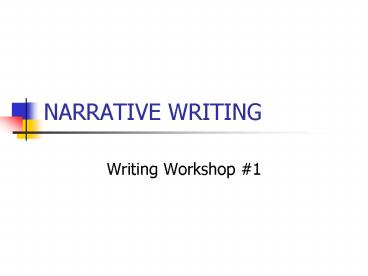NARRATIVE WRITING - PowerPoint PPT Presentation
1 / 23
Title:
NARRATIVE WRITING
Description:
Narrative poems. Short stories. Novels. Using Narrative Writing. A personal ... Share an especially interesting, sad, funny, or meaningful personal experience ... – PowerPoint PPT presentation
Number of Views:205
Avg rating:3.0/5.0
Title: NARRATIVE WRITING
1
NARRATIVE WRITING
- Writing Workshop 1
2
Narrative Writing
- Tells a story
- Captures an experience for the reader
- Can be imaginary or real
- Fictional narrative
- Nonfiction narrative
3
Elements of Narrative Writing
- A narrator
- A consistent point of view
- A well-defined conflict
- Plot
- Setting
- One or more characters
4
Types of Narrative Writing
- Autobiographies
- Biographies
- Myths
- Narrative poems
- Short stories
- Novels
5
Using Narrative Writing
- A personal experience
- An event you observed or heard about
- A story youve imagined
6
Personal Narrative
- Share an especially interesting, sad, funny, or
meaningful personal experience - Share a surprising discovery
- Try to make sense of something that happened to
you
7
At a Glance
- Beginning
- Introduces the incident
- Includes the people and place involved
- Middle
- Describes the event
- Makes the significance of the event clear
- End
- Tells the outcome or result of the event
- Presents the writers feelings
8
Standards for Writing
- Focus on a clear, well-defined incident
- Make significance of the event clear
- Show clearly the order in which events occurred
- Use descriptive details
- Use dialogue to develop characters
- Maintain a consistent tone
9
See How It's Done
"Mind Games" "The First Trip"
10
Writing Prompt
Write a personal narrative about your own
experience or something that happened to someone
you know.
Purpose To entertain or inform Audience Your
classmates, friends, or family
11
Prewriting
- Pick a story
- Why is the event meaningful?
- What is your purpose and who is your audience?
- How will you tell it?
12
Finding Your Story
- Searching your memory
- Think about special moments
- Reflect on people who affected you
- Techniques
- Brainstorming
- Listing
- Cluster Diagram
- Significant Event Graph
13
Significant Event Graph
P o s i t i v e
- - - - -
5 4 3 2 1 1 2 3 4 5
Made the honor roll!
Moved to Las Vegas
I was born!
A
74 77
82 85 89
94
N e g a t I v e
- - - - -
Broke ankle playing tennis
Parents divorced
Grandpa died
14
Sally's Story
-the day her dog died -visiting her grandmother
in a nursing home -the first time she read her
writing before an audience
15
Why Are You Writing?
- To express feelings about an interesting, sad, or
important personal experience - to entertain readers by sharing a funny
experience - to teach readers by sharing a surprising
discovery - to make sense of something that happened to you
16
Digging Up Details
The right details will make your narrative come
to life.
incidents
words
characters
reflecting
images
setting
recalling
17
DRAFTING
- Decide where to begin.
- Keep a time line in mind.
- Use descriptive details.
- Keep the same tone.
- Wrap it up.
18
Quotable Quote
"Most of the basic material a writer works with
is acquired before the age of fifteen." --Willa
Cather
19
Sentence Starters
I learned so much about myself when. The
funniest thing that ever happened to me was
. The thing I remember most about last summer
is.
20
REVISING
- Reviewing your draft
- Coherence Checklist
- Unity Checklist
- Interest-Level Checklist
- Target skill
- Elaborating with Dialogue
- Show rather than tell
21
EDITING
- Edit in Stages
- Reread draft several times
- Check for something different each time
- Read Aloud
- Awkward sentences
- Overused words and phrases
- Target skill
- Correcting Run-on Sentences
22
PUBLISHING
- Reflecting
- Sharing
23
Real World Personal Narrative
Autobiographies
Photographic Journals
Letters
Documentaries
Comedy Monologues
Diaries
Magazine Profiles































